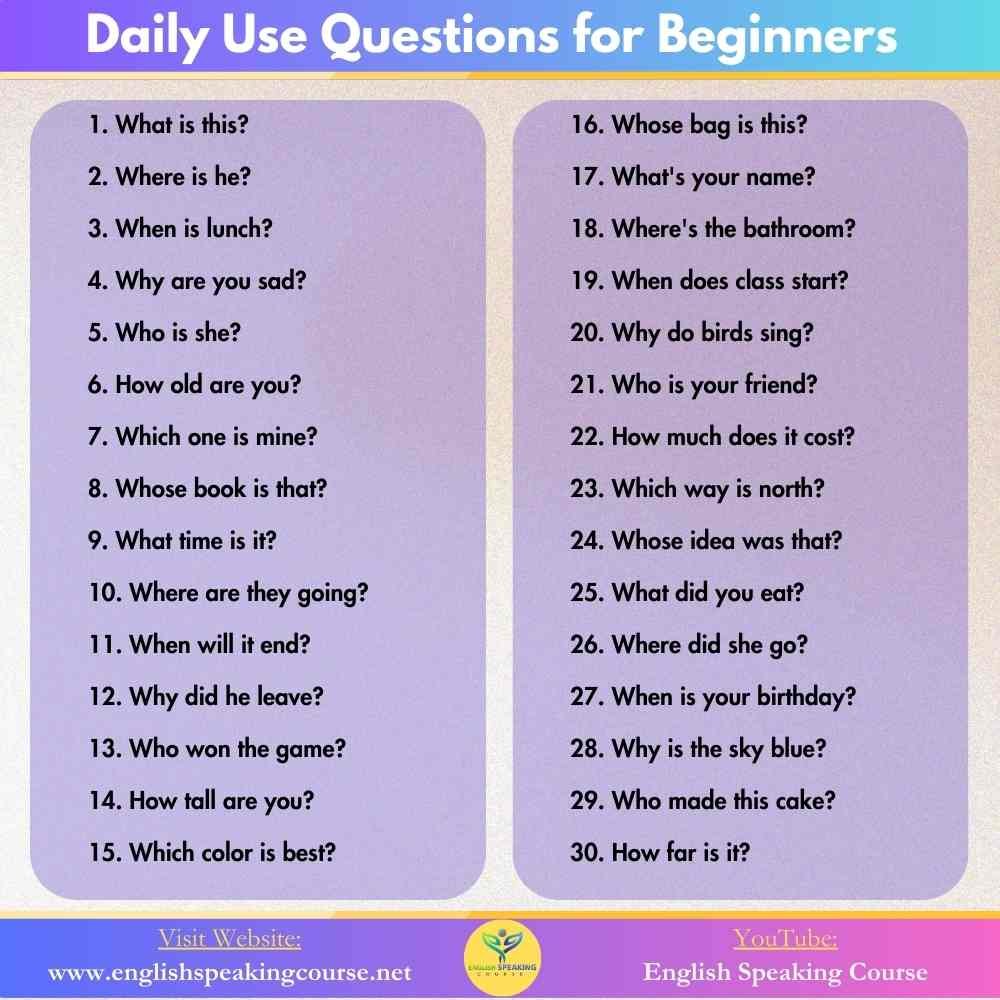Table of Contents
ToggleOutline
Daily Use Questions for Beginners
- Introduction to Wh-Questions
- What are Wh-Questions?
- Importance of Wh-Questions for Beginners
- How to Form Wh-Questions in English
- Using Who
- Using What
- Using When
- Using Where
- Using Why
- Using How
- Examples of Wh-Questions in Daily Conversations
- Practice Exercises for Wh-Questions
- Tips for Improving Wh-Question Skills
- Common Mistakes to Avoid
- Conclusion
Wh-Questions in English
Introduction to Wh-Questions
Communication in English involves various types of questions, and Wh-questions are fundamental. Mastering Wh-questions is crucial for beginners to enhance their language skills and engage in meaningful conversations.
What are Wh-Questions?
Wh-questions are interrogative sentences that begin with question words like who, what, when, where, why, and how. These questions seek information about specific details.
Importance of Wh-Questions for Beginners
For beginners learning English, mastering Wh-questions opens doors to effective communication. These questions help learners gather information, express curiosity, and engage in conversations confidently.
How to Form Wh-Questions in English
Using Who
“Who” questions focus on identifying people. For example, “Who is coming to the party?”
Using What
“What” questions inquire about objects, actions, or situations. For instance, “What are you doing?”
Using When
“When” questions seek information about time or duration. For example, “When is your birthday?”
Using Where
“Where” questions ask about locations or positions. For instance, “Where is the nearest coffee shop?”
Using Why
“Why” questions explore reasons or motives. For example, “Why did you choose this restaurant?”
Using How
“How” questions inquire about manner, condition, or means. For instance, “How did you learn to speak English so fluently?”
Examples of Wh-Questions in Daily Conversations
Daily Use Questions for Beginners
Wh-questions are ubiquitous in daily interactions. Here are some examples:
- Who is that person over there?
- What time does the movie start?
- When is the next bus arriving?
- Where did you go on vacation?
- Why are you late?
- How was your day?
Practice Exercises for Wh-Questions
To master Wh-questions, beginners can engage in practice exercises. Start with simple questions and gradually increase complexity.
Tips for Improving Wh-Question Skills
- Listen actively: Pay attention to how native speakers use Wh-questions in conversations.
- Practice regularly: Consistent practice helps reinforce learning.
- Expand vocabulary: Learn new question words and their usage.
- Seek feedback: Request feedback from teachers or language partners to identify areas for improvement.
Common Mistakes to Avoid
- Incorrect word order: Ensure proper placement of question words in sentences.
- Forgetting auxiliary verbs: Include auxiliary verbs when forming questions.
- Misusing question words: Understand the appropriate context for each question word.
Conclusion
Mastering Wh-questions is essential for beginners to develop strong communication skills in English. By understanding the structure and usage of Wh-questions, learners can engage in meaningful conversations and express themselves effectively.
Wh-Questions in English
Daily Use Questions for Beginners
- What is this?
- Where is he?
- When is lunch?
- Why are you sad?
- Who is she?
- How old are you?
- Which one is mine?
- Whose book is that?
- What time is it?
- Where are they going?
- When will it end?
- Why did he leave?
- Who won the game?
- How tall are you?
- Which color is best?
- Whose bag is this?
- What’s your name?
- Where’s the bathroom?
- When does class start?
- Why do birds sing?
- Who is your friend?
- How much does it cost?
- Which way is north?
- Whose idea was that?
- What did you eat?
- Where did she go?
- When is your birthday?
- Why is the sky blue?
- Who made this cake?
- How far is it?
Most Common Questions for Beginners
- Which dress looks nice?
- Whose turn is it?
- What’s the weather like?
- Where’s your house?
- When does the movie start?
- Why do you laugh?
- Who called you?
- How fast can you run?
- Which team will win?
- What do you want?
- Where’s your pencil?
- When did you arrive?
- Why are you late?
- Who is your teacher?
- How many are there?
- Which book is yours?
- What’s your favorite food?
- Where’s the nearest ATM?
- When is the next train?
- Why do leaves fall?
- Who sang this song?
- How long will it take?
- Which movie to watch?
- What’s in your bag?
- Where’s the nearest cafe?
- When is the meeting?
- Why do dogs bark?
- Who is your hero?
- How big is your house?
- Which restaurant is best?
FAQs (Frequently Asked Questions)
- Why are Wh-questions important for beginners?
- Wh-questions help beginners gather information, express curiosity, and engage in conversations confidently.
- How can beginners improve their Wh-question skills?
- Beginners can improve their Wh-question skills by practicing regularly, expanding their vocabulary, and seeking feedback from teachers or language partners.
- What are some common mistakes to avoid when forming Wh-questions?
- Common mistakes include incorrect word order, forgetting auxiliary verbs, and misusing question words.
- What are some examples of Wh-questions in daily conversations?
- Examples include “Who is that person over there?” and “What time does the movie start?”
- Where can beginners find additional resources for practicing Wh-questions?
- Beginners can find additional resources online, such as language learning websites, textbooks, and language exchange platforms.




